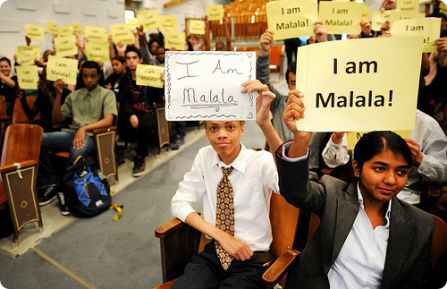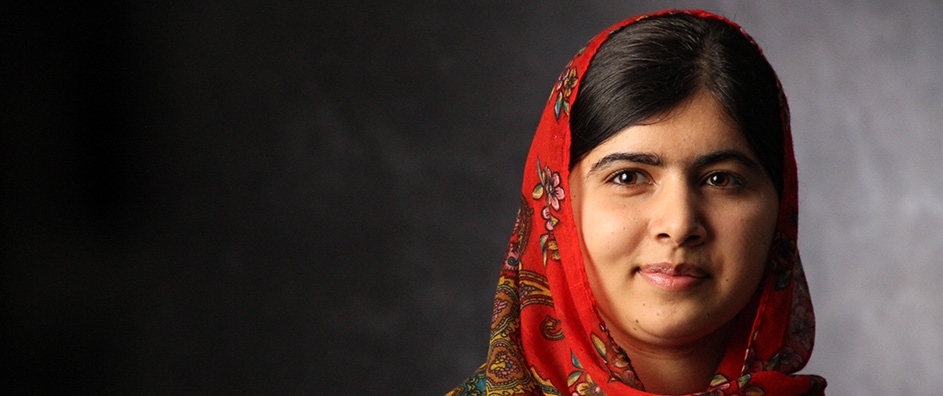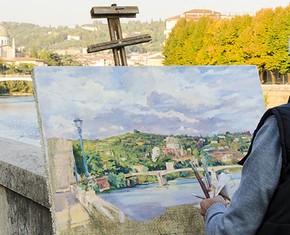The views expressed in our content reflect individual perspectives and do not represent the authoritative views of the Baha'i Faith.
“I am Malala.”
Men, women, boys and girls from all parts of the globe now say “I am Malala.” It’s a great buzzword. It makes people feel good. Their support of Malala Yousafzai, the fifteen-year-old Afghan girl whose attempted assassination by the Taliban commanded the attention of people worldwide, is commendable. But do they realize what those words mean? Malala’s crime, in the eyes of religious extremists, was courage—courage in spite of the known danger—to advocate for the education of girls. When people say, “I am Malala,” they are showing support for allowing girls to attend school — that which brought down the wrath of Muslim fanatics. But above and beyond her passion for education, her courage in proclaiming it publicly despite knowing the danger in which she was placing herself, has made the now 17-year-old the youngest-ever recipient of the Nobel Peace Prize.
The courage she displayed then is still with her. In an interview with Diane Sawyer, Malala spoke of wanting to return to Afghanistan. She likened it to the sentiment of Dorothy in The Wizard of Oz:
Yes, there’s no place like home. And I believe it. If you go anywhere, even paradise, you will miss your home. And I do miss my home.
When asked, “But won’t it always be too dangerous?” Malala replied:
I think life is always dangerous. Some people get afraid of it. Some people don’t go forward. But some people, if they want to achieve their goal, they have to go. They have to move….We have seen the barbaric situation of the 21st century in Swat. So why should I be afraid now?
Ms. Sawyer then asked, “Do you know how close you came to death?” Malala said:
I think death didn’t want to kill me. And God was with me, and the people prayed for me… and now I know that you must not be afraid of death. And you must move forward. You must go forward, because education and peace is very important.
 Anyone who chooses to say, “I am Malala,” should be prepared to prove it. When they face their own trials, they’ll need to find courage through the same faith in God that helped Malala live up to her convictions.
Anyone who chooses to say, “I am Malala,” should be prepared to prove it. When they face their own trials, they’ll need to find courage through the same faith in God that helped Malala live up to her convictions.
As a young Muslim girl, she understood the words of her holy book, The Qu’ran, in which Mohammed assured His followers:
We will not burden a soul beyond its power.
When I think of her incredible courage it brings to mind Abdu’l-Baha’s advice:
Do not look at your weakness, nay, rely upon the confirmation of the Holy Spirit. Verily, It maketh the weak strong, the lowly mighty, the child grown, the infant mature and the small great. – Tablets of Abdu’l-Baha, Volume II, p. 274.
That’s how this amazing young woman could face the very real threat of being harassed or killed for defying the Taliban. The Baha’i teachings say:
Tests and trials only cause agitation to weak hearts. But the pure souls, a hundred thousand tests are but to them like mirage, imagination and shadow. The shadow cannot withstand the rays of the sun and pure fragrances of holiness will not be concealed through the doubts of the beetle. The headache of wavering (or hesitancy) will not affect those exhilarated with the wine of the love of God. – Ibid., p. 251.
Malala seems like one of those pure souls. May all who face their own severe, life-threatening trials keep her example in mind and look to the Lord for assistance. Perhaps this passage from the Baha’i teachings can help everyone who wishes to say, “I am Malala”—and have the courage to prove it:
Man must so live that he may become beloved in the sight of God, beloved in the estimation of the righteous ones and beloved and praised by the people. When he reaches this station the feast of eternal happiness is spread before him. His heart is serene and composed because he finds himself accepted at the threshold of His Highness, the One. His soul is in the utmost felicity and bliss even if he be surrounded by mountains of tests and difficulties. He will be like unto a sea on the surface of which one may see huge white waves, but in its deeps it is calm, unruffled and undisturbed. – Abdu’l-Baha, Star of the West, Volume 7, p. 101.
















Comments
Sign in or create an account
Continue with Googleor